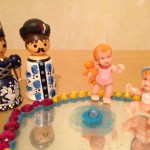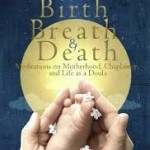“A woman can spin a primal umbilical rope within her womb through which she passes life-energy to the future.” –Melissa Raphael
“In some indigenous cultures of the Americas there is the practice of finding one’s death song while alive. This song becomes the ally of the person throughout their lives, so that they become very acquainted with what the song means in their lifetime. Death then, is a companion of life, and is never forgotten. In the hour of death, these people would, if they were able to, sing their death song–exiting this world with song on their lips and no doubt feeling the power their ally-song had gathered by being with them in their life. I can see that a death song would provide a connection between the person and the cycles of life, guiding the dying person into the next world and helping to allay fear…” –Leslene della-Madre, Midwifing Death
I was introduced to blessingways, or mother blessing ceremonies, as a girl when my mother’s group of friends hosted them for each other during their pregnancies. I loved attending the ceremonies for my mom during her pregnancies with my younger brother and sister and witnessing the web of love, support, and commitment woven around her. They touched me deeply with their sacred, magical, and mysterious flavor. When I was twelve, the same group of friends had a coming of age blessingway ritual for the daughters of the group, ranging in age from 10-16. It was a mystical, beautiful experience. We wore wreaths of flowers in our hair and were blessed with wisdom and tokens from the wise women of our tribe. At 34 years old now, I still have my folder of prayers, quotes, and messages from that day. For years it smelled faintly of rose petals. My favorite song from these rituals of my girlhood was Woman Am I:
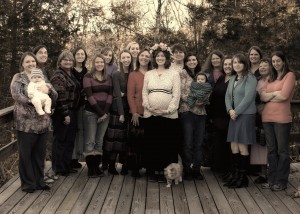
Woman am I
Spirit am I
I am the infinite within my soul
I have no beginning
and I have no end
All this I am.
Later, when my youngest sister was entering her teenage years, I helped my mom and her friends plan a similar ceremony for the girls in that age range. I was 13 weeks pregnant with my oldest son at the time. Again, we sang. My mom had a blessingway ritual for me, the first she’d planned and facilitated alone and in so doing, passed the “torch” of these rituals along to a new circle of women, my friends. Woman Am I, remained my favorite chant. I hummed it throughout my labor with my first baby and my mom hummed it with me–sometimes through the bathroom door or in the car as we drove to the birth center. After my son was born, sequestered clots prevented the normal contraction of my uterus and a manual extraction was performed. It was extremely painful and I hummed Woman Am I very, very loudly to stop myself from screaming. My mom hummed with me while my husband held and marveled at our new baby boy. Singing this song in labor cemented it in my soul as my song, our song. We’ve sung it many more times since then—at mother blessing ceremonies and women’s rituals and spontaneously, or alone in the shower or while vacuuming (adds pizazz to humdrum activities!), at my blessingway with my second son, my friend’s blessingways with her fifth, sixth, and seventh babies, at the close of a Meetings at the Moon series of classes I facilitated for the preteen daughters of my friends. A recording of my friends singing together at the skating rink as a gift for a long-distance friend for her virtual mother blessing may be found here.
In 2009, when my third baby died unexpectedly while early in my second trimester, I once again relied on Woman Am I as a 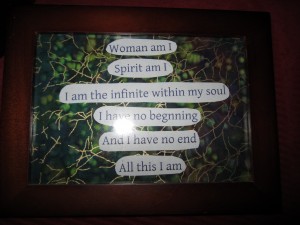 coping tool to handle his labor. He was born at home, peacefully and beautifully and with so much love, but in the hours that followed, I began to lose grapefruit-sized clots of blood and we made the difficult decision to transfer to the emergency room. As we left the house, I had a mystical experience in which I accepted that was perhaps dying and that birth, that which I had loved so much, was going to be the thing that killed me. In the car as we drove, I sang my song over and over so that my husband and my mom would know I was still alive. As long as I was singing, I knew I was still here. Fortunately, I lived to sing it again many more times in sunshine and in rain, in holding hands with circles of women and while alone. After singing with me at a post-miscarriage ritual, my friends again sang to me at my blessingway with my pregnancy-after-loss rainbow baby girl, who was born on a midday in winter admidst the most profound joy and relief I have ever known. On my birth altar was a picture sent to me by a long distance friend with the words to Woman Am I collaged onto fabric.
coping tool to handle his labor. He was born at home, peacefully and beautifully and with so much love, but in the hours that followed, I began to lose grapefruit-sized clots of blood and we made the difficult decision to transfer to the emergency room. As we left the house, I had a mystical experience in which I accepted that was perhaps dying and that birth, that which I had loved so much, was going to be the thing that killed me. In the car as we drove, I sang my song over and over so that my husband and my mom would know I was still alive. As long as I was singing, I knew I was still here. Fortunately, I lived to sing it again many more times in sunshine and in rain, in holding hands with circles of women and while alone. After singing with me at a post-miscarriage ritual, my friends again sang to me at my blessingway with my pregnancy-after-loss rainbow baby girl, who was born on a midday in winter admidst the most profound joy and relief I have ever known. On my birth altar was a picture sent to me by a long distance friend with the words to Woman Am I collaged onto fabric.
Almost three months ago, my grandma died. She lived in California and my mom went to her and “doula’ed” her through her final days. One Sunday in April, when we thought we’d reached my grandma’s final day on earth. I spent the day thinking about her, crying, talking to my husband, and fanatically checking my phone for texts from my mom (side note to people who write critical blog posts about “distracted” people “glued” to their phones, they may do well to remember that some of those distracted-looking people might be looking for texts about dying grandmothers from their own distraught mothers and that this phone-based link in fact represents connection and not disconnection or distraction). I went to my sacred place in the woods and I sat on the rocks and sang Woman Am I. My mom told me she’d been singing it to my grandma as she listened to the erratic sounds of her breaths, thinking each was the last. Though we were two thousand miles apart geographically, in that moment these three generations were linked in one song.
After singing on the rocks, I then spoke aloud to my grandma, my final words that didn’t really come in the letter I sent her or on our Facetime call:
Last Words
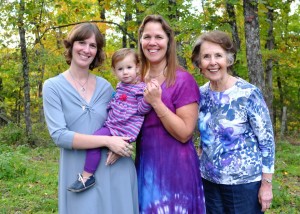
We learned from you
we loved with you
we heard you
we saw you
we hugged you
and held you
we mourned with you
we mourned for you
we have been dazzled by your radiance
inspired by your adventures
and touched by your generosity.
Three generations of people
sat in your lap as children
were covered by your quilts
and zipped into your sweaters
you carried each of us on your hip
and held us each in your heart
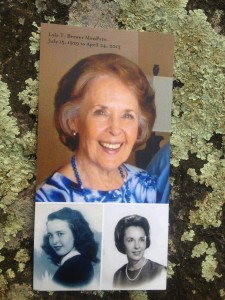
We respect you
we cherish you
we appreciate you
we’ve learned so much from you
we’ve laughed with you
and lived with you
and traveled with you
and now
we open up our hands
we open up our hearts
and we let you go.
Be free.
Continue your travels
on the currents of time and space…
Go in peace
go in love
and go knowing that you have left behind
something beautiful
something marvelous
something that matters
The fabric of a life well-lived
the hearth of a family well-tended
the heart of a community strengthened
and a never-ending chain of generations
unbroken.
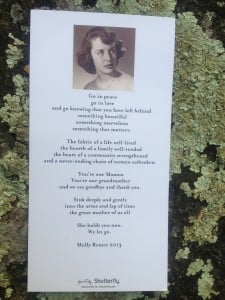
You’re our Mamoo
You’re our grandmother
and we say goodbye
and thank you.
Sink deeply
and gently
into the arms and lap
of time
the great mother of us all
She holds you now.
We let go…
When I came in from the woods, my mom texted me again saying she’d sung all the blessingway and goddess songs she could remember and she needed more—so, I wrote back to her with lyrics after lyrics and as she received my texts she sang softly by my grandmother’s head, holding her hand and blessing the way as well as she could, using these words to soothe, connect, and release. Being able to make this connection, virtually, and contribute to the circle of song surrounding my grandma was a profound experience—like I sent words to my mom who shared them with my grandma and we created a circle from across the miles, woven by the words of our life songs, birth songs, death songs…

